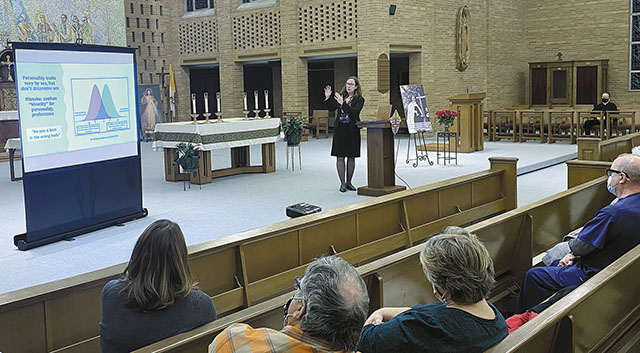
MADISON — After more than two years, a nearly full oratory of people came out to hear the latest in the Diocese of Madison’s St. Thérèse Lecture Series.
The topic, on November 16 at Holy Name Heights in Madison, was on the Catholic response to the recent issues and concerns over gender ideology.
The speaker was Theresa Farnan from the Person & Identity Project.
Farnan is an author and moral philosopher who specializes in virtue ethics, moral education, philosophy of the person, gender and sexuality, and ethical issues facing the family.
Role as Catholics
Farnan emphasized that people, especially children and teens, who are struggling with issues of gender “deserve our compassion,” but we are also called to “hold to the truth”.
She added that “We are children of God” and made both male and female.
Sharing facts
Through her use of slides, charts, and other data, Farnan shared some facts illustrating the current state of gender issues, especially how they relate to young people.
She talked about the historical shift in attitudes toward these issues, such as changes in word usage in the Diagnostic and Statistical Manual of Mental Disorders (DSM) leading to the recent use of the term “gender dysphoria” and a new premise that to be transgender or “born in the wrong body” is “normal”.
She also shared how some professionals try to determine gender dysphoria in children.
These include a distress or impairment of at least six months of criteria including “desire to be the other gender,” “preference for toys typical of the other gender,” and “preference for playmates of the other gender”.
Farnan also displayed the “Gender Unicorn” that is being shown and used in many schools.
This image shows that a young person can determine their gender by their feelings by things such as “woman-ness” or “man-ness,” masculinity and femininity, and which gender they feel they are romantically attracted to.
Farnan emphasized that gender confusion in young people can be brought about by “feelings and stereotypes” and is not based on science, which supports that there are two distinctive genders — male and female.
She did acknowledge that “intersex” people, or persons who exhibit aspects of both male and female reproductive organs, are real cases, but they are rare, compared to the number of people who are identifying as transgender.
How to respond
Farnan gave some advice and suggestions, especially for parents, on what to do on topics and situations of gender.
She emphasized the importance of relationship-building between parents and children.
“Talk to them,” “give them your time,” she said.
She encouraged parents and others to mention the medical harm that can happen to young people if they undergo surgical procedures or take medications.
Another strong encouragement was to “get kids off screens.”
She noted the harm that can come to young people from “influencers” who promote harmful ideas online.
Ultimately, she called on parents to “pray for your kids” and give them the spiritual support and strength they need throughout their lives.
Letter from Bishop Hying
Bishop Donald J. Hying of Madison was away at the U.S. bishops fall assembly in Baltimore on the night of the lecture, but attendees did receive a copy of a letter that he wrote.
It said, in part: “The issue of transgenderism and gender confusion is a complex and contested dynamic. Individuals who truly experience gender dysphoria need both medical and pastoral accompaniment. The Church seeks to reach out to them and their families with compassion, grounding such efforts in the dignity of the human person, created by God in His image and likeness. The Church couples that compassion with the truth of the human person, as revealed in our identity and sexuality. We proclaim that truth, both with courage and love, in the face of destructive ideologies which are confusing and damaging our young people today.”
More information
More information on the Catholic approach to gender issues can be found at: https://personandidentity.com
The basics of “What is the human person?” and competing views between the “Catholic Christian” view and the “dominant secular” view of the human person can be found on the site by clicking on “THE BASICS” on the homepage.
There, you can find more information on “What is gender ideology?”, terminology, frequently asked questions, and medical information.

